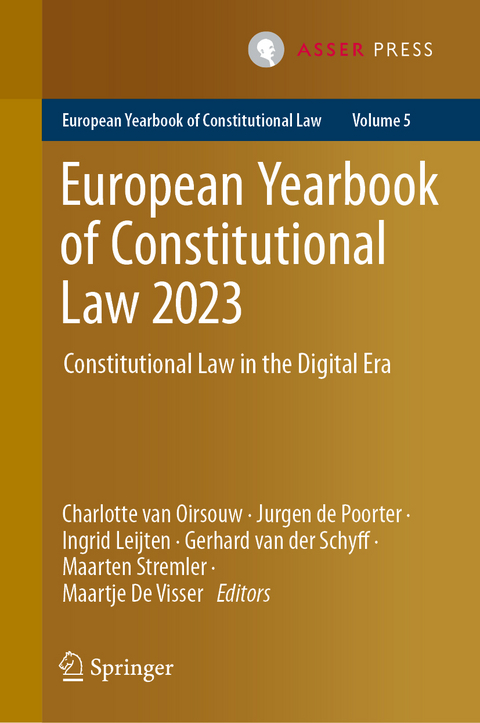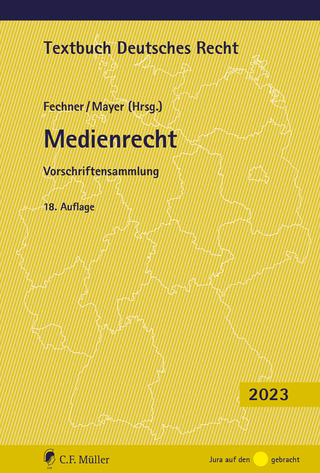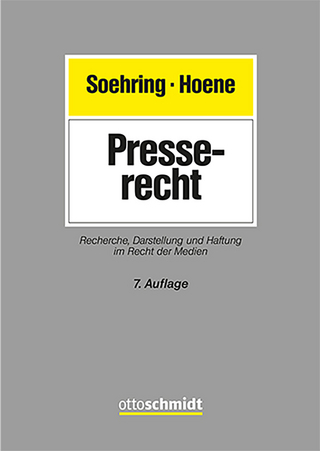
European Yearbook of Constitutional Law 2023
T.M.C. Asser Press (Verlag)
978-94-6265-646-8 (ISBN)
- Noch nicht erschienen - erscheint am 03.01.2025
- Versandkostenfrei innerhalb Deutschlands
- Auch auf Rechnung
- Verfügbarkeit in der Filiale vor Ort prüfen
- Artikel merken
This book addresses the theme Constitutional Law in the Digital Era. Societies are increasingly affected by the use of digital technologies by both public and private actors. This has resulted in a range of normative questions that require a constitutional response. The book explores a number of issues concerning the relationship between the impact of digitalisation and constitutional values by examining the constitutional challenges arising from the increasing use of digital technologies and develops potential constitutional responses and remedies to these challenges.
This volume will be of special interest to constitutional and legal scholars who are interested in EU and national constitutional law, as well as to social scientists more generally (e.g. governance, sociology, science and technology, as well as computer and data scientists). In addition, the book is relevant for judges, government officials and policy-makers who work on the intersection of digitalisation and (EU) constitutional law.
Charlotte van Oirsouw is a PhD researcher at Utrecht University School of Law, Department of Constitutional and Administrative Law. Jurgen de Poorter is State Councillor at the Dutch Council of State and Professor at Tilburg Law School, Department of Public Law and Governance. Ingrid Leijten is Professor at Tilburg Law School, Department of Public Law and Governance. Gerhard van der Schyff is Associate Professor at Tilburg Law School, Department of Public Law and Governance. Maarten Stremler is Assistant Professor at Maastricht University, Faculty of Law, Department of Public Law. Maartje De Visser is Professor at Yong Pung How School of Law, Singapore Management University.
Chapter 10 is available open access under a Creative Commons Attribution 4.0 International License via link.springer.com.
Chapter 1. Constitutional law in the Digital Era.- Chapter 2. The Invisible Citizen in the Digital State: Administrative Law meets Digital Constitutional Constitutionalism.- Chapter 3. Public data, AI applications and the Transformation of the State: Contemporary Challenges to Democracy.- Chapter 4.- Jawboning Content Moderation from a European Perspective.- Chapter 5. Constitutional Adaption to Conflict and Competition in Algorithmic Society: In Search of Proportional Solutions to Political Harms on Social Media Platforms.- Chapter 6. Discrimination in the Age of Algorithms - Is EU Law Ready?.- Chapter 7. The Debiasing Paradox: Facial Recognition Technology and Biometric Identification Systems in the Artificial Intelligence Act.- Chapter 8. The Role of the EU Right to Good Administration in Shaping Algorithmic Decision Systems.- Chapter 9. Artificial Free Thought: Automated Courts and the Independent Algorithm.- Chapter 10. The Constitutional Right to an Effective Remedy in the Digital Age: A Perspective from Europe.
| Erscheinungsdatum | 17.12.2024 |
|---|---|
| Reihe/Serie | European Yearbook of Constitutional Law |
| Zusatzinfo | 2 Illustrations, black and white; Approx. 250 p. |
| Verlagsort | The Hague |
| Sprache | englisch |
| Maße | 155 x 235 mm |
| Themenwelt | Recht / Steuern ► EU / Internationales Recht |
| Recht / Steuern ► Öffentliches Recht | |
| Recht / Steuern ► Privatrecht / Bürgerliches Recht ► Medienrecht | |
| Schlagworte | administrative law • AI Act • Algorithmic bias and discrimination • Artificial Intelligence (AI) • Automated Decision-Making • constitutional law • Digital constitutionalism • Digital public law • Digital Services Act (DSA) • European Law |
| ISBN-10 | 94-6265-646-0 / 9462656460 |
| ISBN-13 | 978-94-6265-646-8 / 9789462656468 |
| Zustand | Neuware |
| Informationen gemäß Produktsicherheitsverordnung (GPSR) | |
| Haben Sie eine Frage zum Produkt? |
aus dem Bereich


